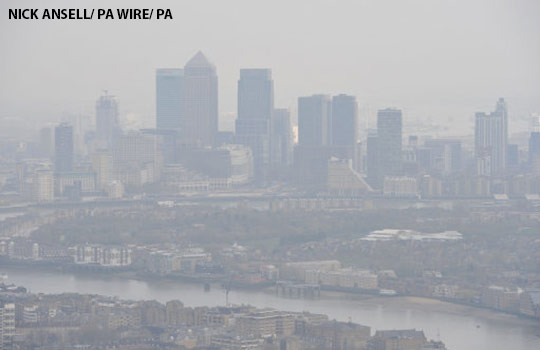 One explanation that has been offered for the UK’s self-destructive decision to leave the European Union is that there are now few people left alive who can remember the ruined Europe after the Second World War. Last year saw the 60th anniversary of the Clean Air Act, but it seems that the great smogs and the death toll they brought has also faded from memory. How else to explain the extraordinary observation that a substantial proportion of the air pollution responsible for the “very high” air quality alert being issued for London last week was due to particulates from wood-burning stoves? Wood smoke is a major source of harmful PM2.5. DEFRA figures show that domestic wood burning is, at 47 kilotonnes/year, the UK’s largest single source of PM2.5 emissions—nearly 3 times greater than all PM2.5 emissions from traffic.
One explanation that has been offered for the UK’s self-destructive decision to leave the European Union is that there are now few people left alive who can remember the ruined Europe after the Second World War. Last year saw the 60th anniversary of the Clean Air Act, but it seems that the great smogs and the death toll they brought has also faded from memory. How else to explain the extraordinary observation that a substantial proportion of the air pollution responsible for the “very high” air quality alert being issued for London last week was due to particulates from wood-burning stoves? Wood smoke is a major source of harmful PM2.5. DEFRA figures show that domestic wood burning is, at 47 kilotonnes/year, the UK’s largest single source of PM2.5 emissions—nearly 3 times greater than all PM2.5 emissions from traffic.
The Danish concept of Hygge, “creating cosy and convivial atmospheres that promote wellbeing,” is fashionable at the moment, especially among people selling candles and small books on how to live. Fire lighting is a key part of this, but the harms to wellbeing this causes are perhaps under-appreciated. In addition to the impact wood smoke has on stove users’ own indoor air quality, it contributes to the outdoor air quality crisis. Like London, Denmark’s capital Copenhagen has a significant wood smoke particulates problem—winter PM2.5 emissions from wood smoke exceed those from the whole year’s traffic.
Air pollution has direct effects on the development of lung disease and increases exacerbations in those who have lung disease already. Like smoking, it also increases the risk of heart attacks and strokes. Poor air quality is the third leading cause of death worldwide and contributes to 40,000 deaths/year in the UK and 9,500 deaths/year in London. We need to strengthen enforcement of air quality laws and a new, stronger Clean Air Act—although many users will have bought wood-burning stoves in good faith, in the mistaken belief that they are a “carbon neutral” energy source, wood burning stoves surely have no place in an urban environment or in a context where urgent action is needed to combat climate change.
And Brexit? A warning this week from the United Nations Special Rapporteur on human rights and hazardous substances and wastes: “EU regulations have strengthened human rights protections from various sources of pollution and contamination in the UK……… Politicians in the UK and US have pushed in recent years for deregulation of businesses, and mutual recognition of standards across the Atlantic, without due consideration of the role such regulation plays for the protection of human rights.”
Nicholas S Hopkinson is a reader in Respiratory Medicine, Imperial College London.
Competing interests: None declared.
References
- Defra National Statistics Release: Emissions of air pollutants in the UK, 1970 to 2015
- End-of-visit statement by the United Nations Special Rapporteur on human rights and hazardous substances and wastes, Baskut Tuncak on his visit to the United Kingdom, 17 – 31 January 2017
- Royal College of Physicians 2016 Every breath we take. The lifelong impact of air pollution.
